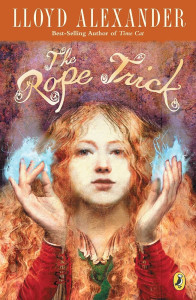 What is magic? Although she doesn’t know it, this is the question confronting Lidi, a young traveling magician, whose sleight of hand tricks earn her a living and bring her across the path of some likeable companions and some unsavory characters in her search for the legendary magician Ferramondo and the Rope Trick. Early on, Lidi and her companion Jericho, a juggler and protective presence in Lidi’s life since her magician father’s passing, take in a bedraggled young girl named Daniella — with a gift for prophesying the future — and Julian, a handsome young man on the run from an unjust charge of murder. Unfortunately, Lidi’s search for Ferramondo is hampered by the greedy Scabbia’s pursuit of Daniella, whom he believes holds the keys to his good fortune.
What is magic? Although she doesn’t know it, this is the question confronting Lidi, a young traveling magician, whose sleight of hand tricks earn her a living and bring her across the path of some likeable companions and some unsavory characters in her search for the legendary magician Ferramondo and the Rope Trick. Early on, Lidi and her companion Jericho, a juggler and protective presence in Lidi’s life since her magician father’s passing, take in a bedraggled young girl named Daniella — with a gift for prophesying the future — and Julian, a handsome young man on the run from an unjust charge of murder. Unfortunately, Lidi’s search for Ferramondo is hampered by the greedy Scabbia’s pursuit of Daniella, whom he believes holds the keys to his good fortune.
Or is it? As they dodge Scabbia and chase rumours of Ferramondo, Lidi and her companions find another kind of magic. They meet people whose lives have been touched by Ferramondo, who seems to bring out the best in people simply because of the way he sees the world, and this vision works its own magic, as people take action to transform their lives. Finally, when Daniella has been kidnapped, and she and her companions are trapped, Lidi realizes that the rope trick is her only hope — but can she do it, with the little she has learned about Ferramondo? And Julian? What kind of magic is that?
Set in a Renaissance-era landscape that could be either Mediterranean Europe or somewhere in Latin America, this is a charming story, filled with Alexander’s trademark spunky characters, evil born of selfishness, and magic woven into the fabric of the landscape and the characters’ lives. I have always admired the way that Alexander is able to weave political elements into his stories, making his tales for young readers ring true to the complexities of the post-modern era. For Alexander, the personal and political are truly blended, as characters confront systemic injustices, which are the logical outcomes of governments that lack heart. In this case it is an unjust system of land ownership that dooms many to lives of hard work on large farms, from which they can be expelled at any time, and a justice system that caters to the rich and powerful. Travelers like Lidi and her companions observe these happenings along with the reader, and occasionally their lives intersect with settled folk, through their magic shows or when a renegade like Julian needs the help of some anti-establishment itinerant performers.
This is an engaging story, one that captures the difficulties of growing up in a world filled with both the magical and the mundane. Fans of Alexander’s Westmark trilogy or The Arkadians will also enjoy The Rope Trick. Many kinds of magic make an appearance here, from the magic that comes from good friends, to the mystic’s vision, to the kindliness that gets magnified as it travels from person to person — and the rope trick? You’ll just have to read the book to find out!
(Dutton Children’s Books, 2003)
